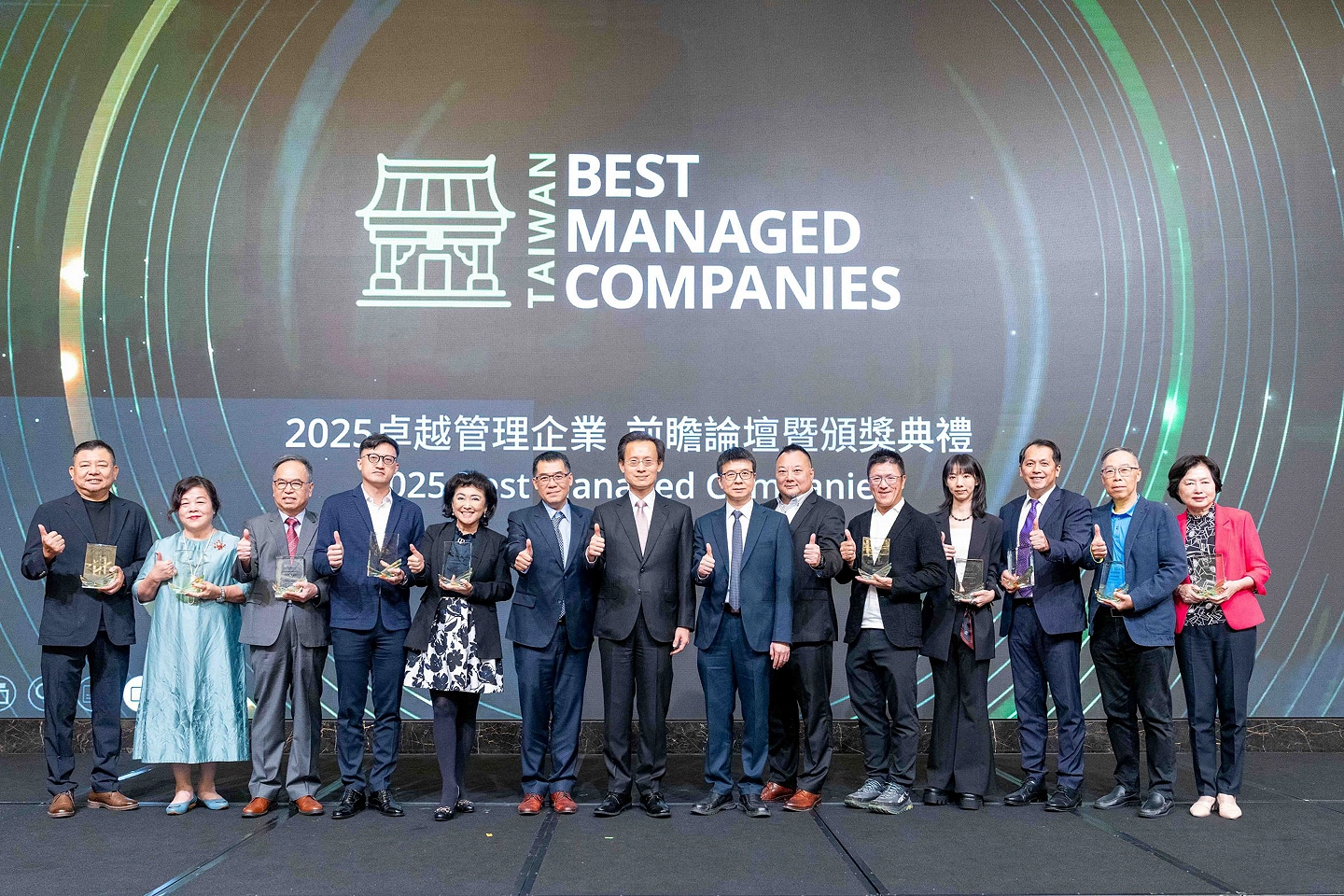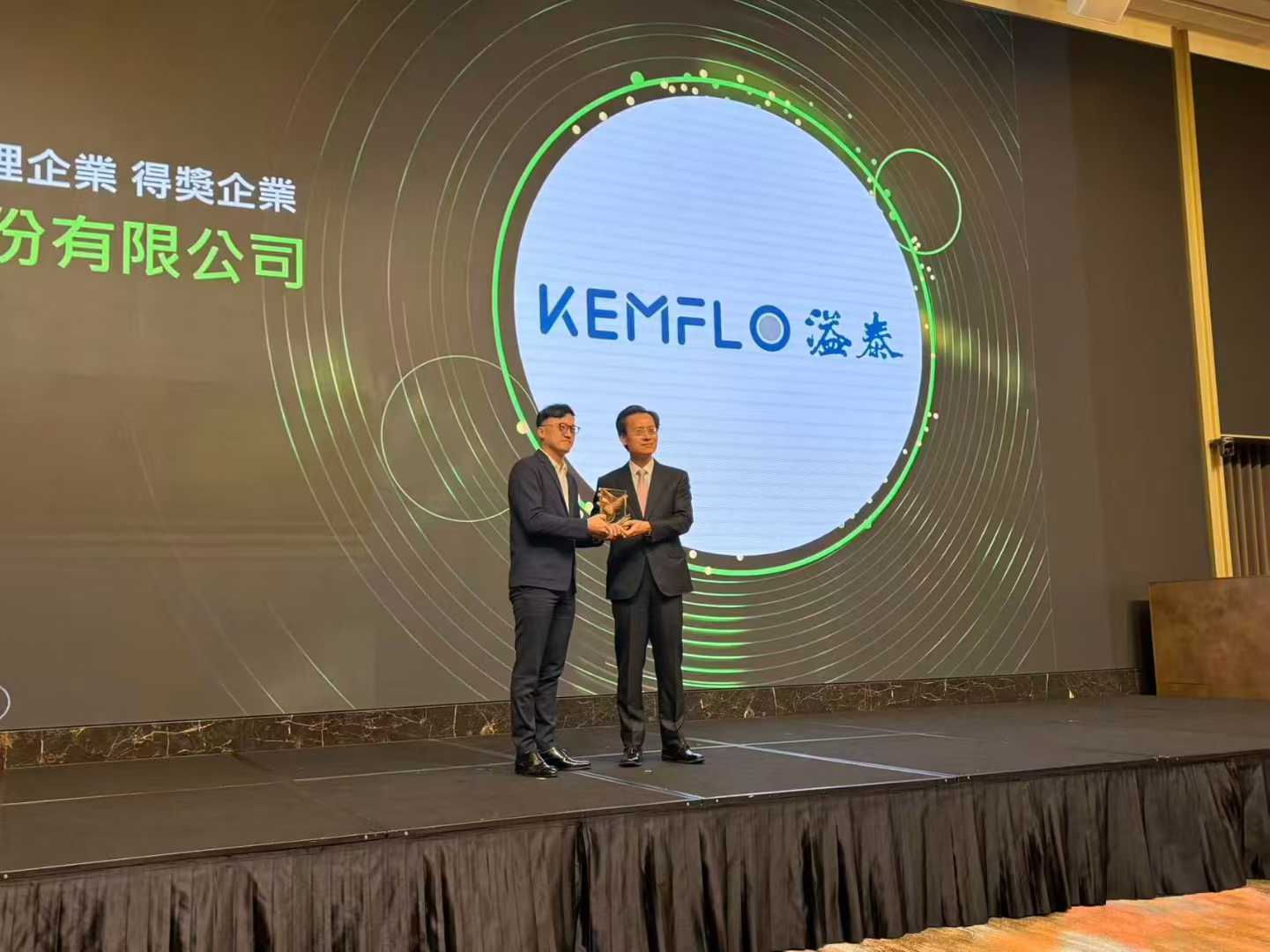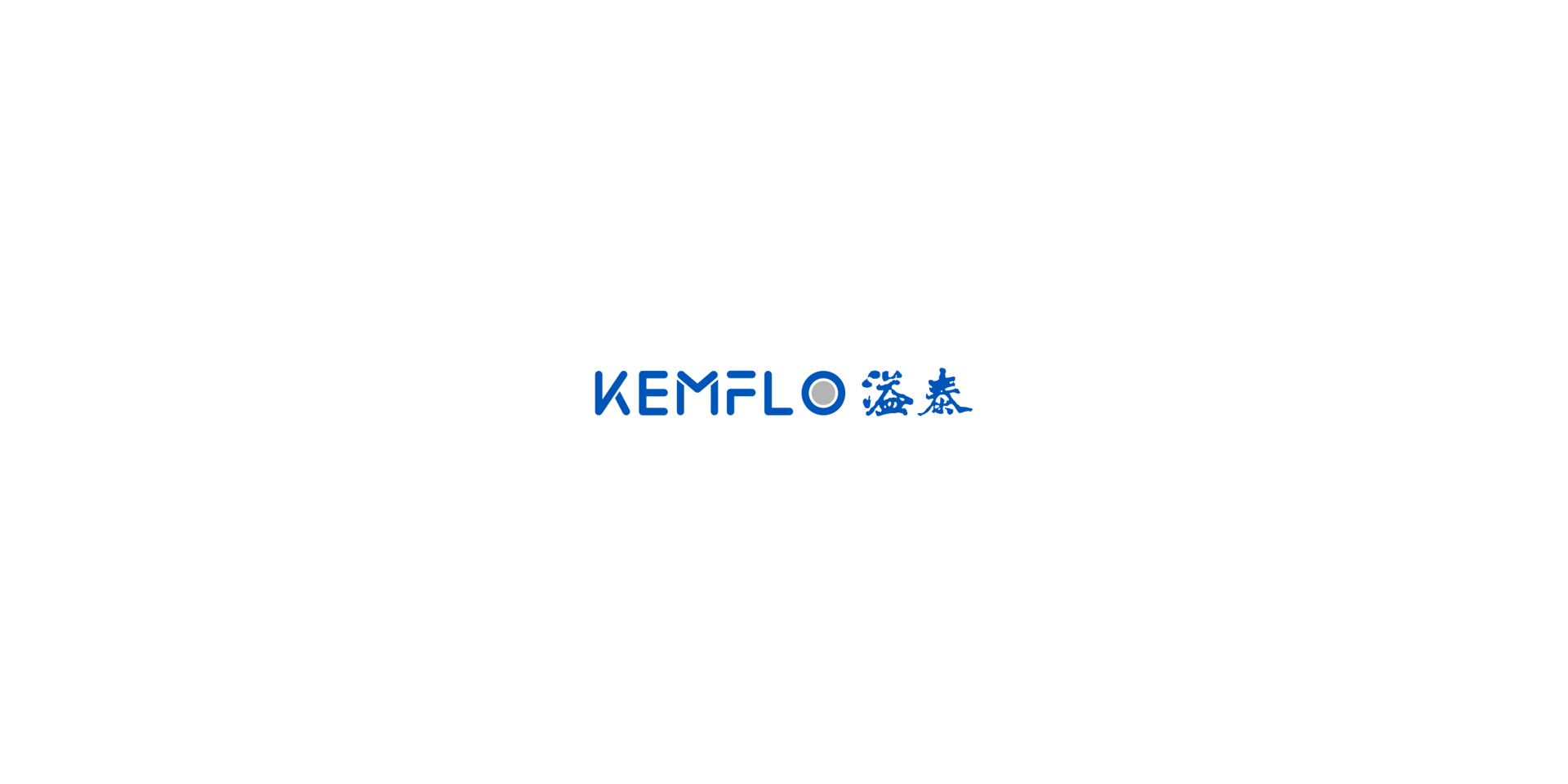KEMFLO Industrial has been awarded the 2025 KPMG "Excellence in Management" Award.

The picture shows KEMFLO Group CEO Lin Yu-Chun (fourth from the left) taking the stage to receive the award.
[2025/09/19, Taipei News]Full text source
Hosted by Deloitte PrivateThe 5th Best Managed Companies (BMC) awards were announced today (19).,KPMGAccording to the four major theoretical frameworks of "strategy, capability and innovation, corporate culture and commitment, corporate governance and finance," the 2025 "Best Managed Companies" were selected, with six new award-winning companies including: "Hexagon International Business Co., Ltd., Clay International Development Co., Ltd., Coffee Code Co., Ltd., Ding Yang Technology Co., Ltd., KEMFLO, and Lian Jia Optoelectronics Co., Ltd."; companies that have been selected in previous years continue to demonstrate exemplary management in the industry, and this year a special "Exemplary Award" was established, with the awarded companies being "Ken Yi International Co., Ltd., Yi Zhang Industrial Co., Ltd., Huaxia Glass Co., Ltd., Qingzhan Technology Co., Ltd., and Ju Gang Machinery Co., Ltd."
KPMG pointed out that Taiwanese companies are at a critical moment of global supply chain restructuring and increasing uncertainty in the international market. Companies must layout strategies early, strengthen governance, actively seek transformation opportunities, and implement sustainable management in daily operations to continuously challenge innovation on the basis of ensuring long-term stability and demonstrate deeper competitiveness on the international stage.
Five years of glorious milestones, cross-border collaboration towards a new pattern.
KPMG President Ko Chih-HsienIt is stated that KPMG Family Office has long been dedicated to accompanying high-net-worth asset clients and family businesses, assisting them in finding growth momentum in generational succession, cross-border investments, and global layout. In the current rapidly changing environment, the international supply chain is experiencing new breaking points and restructuring opportunities due to the U.S.-China tariff policies. Companies not only need to maintain operational efficiency but also must possess the ability to adjust flexibly.
Ke Zhi-xian emphasized that Taiwanese family businesses should regularly review their strategic development context based on the foundation of business succession, proactively layout opportunities for transformation and upgrading, and make sustainable management a core mindset. This is not only a financial issue but also relates to corporate culture, employee value, and social responsibility. This year's event collaborated with Taiwan Life Insurance Co., Ltd., hoping to provide more diverse and forward-looking perspectives for businesses in capital layout, risk management, and asset succession, and to assist Taiwanese companies in demonstrating new leadership models amidst challenges, finding the best path for sustainable growth and value creation.

The picture shows KEMFLO Group CEO Lin Yu-Chun (left) receiving the award on stage.
Tariff Weather Vane - How Companies Steer Through the Waves of Supply Chain Challenges
Pan Chia-Chuan, Chief Operating Officer of KPMG's Strategy, Risk and Transaction Services.It is pointed out that global inflation is gradually cooling, and major economies are entering a cycle of interest rate cuts. However, affected by tariff policies, companies still face supply chain risks and uncertainties. In the short term, the extent of interest rate cuts in the United States is limited, and companies may advance imports due to tariff considerations, driving inventory and equipment investment. Some major industries in Taiwan are also directly affected by tariff policies.
Pan Chia-Chuan suggested that companies can enhance operational flexibility and risk resistance by adopting a dual-track model of "regional short chains" and "global long chains" through diversified supply chain layout strategies. Establishing local offices or regional headquarters in the United States or nearby areas can quickly respond to market demands and strengthen supply control capabilities. The Southeast Asian region, due to its geopolitical stability, along with the existing industrial clusters and policy support for Taiwanese businesses, can also serve as a diversified layout point.
In addition, companies can make good use of merger and acquisition strategies to enter local markets, with vertical integration ensuring the supply of key raw materials and reducing costs; at the same time, combining technological tools to manage supply chain operations, monitor risks and changes in real-time. Pan Chia-Chuan emphasized that although tariff policies pose challenges, if effective planning and layout can be achieved, companies will be able to turn uncertainty into strategic advantages and seize opportunities in the restructuring of the global supply chain.
Kaohsiung Asia Asset Management Center: The Southbound Momentum of Taiwan's Capital Market
KPMG Asia Pacific Innovation Services Center CEO Lai Yongfa, Senior AccountantIt is stated that Kaohsiung is not only a port city but also has unique advantages due to its proximity to the Southeast Asian market. If combined with the policy positioning of an asset management center, Kaohsiung has the potential to become an important hub connecting asset flows in the Asia-Pacific region, attracting multinational asset management institutions and family offices to establish a presence.
Lai Yongfa pointed out that financial institutions will face more opportunities for cross-border cooperation in asset allocation. For example, as Kaohsiung gradually forms a regional asset management cluster, businesses entering the center can combine with professional service organizations to provide integrated solutions from risk management to cross-border asset allocation, ensuring both the security and growth of clients' assets.
Senior accountant Lai Yongfa also added from the perspective of family businesses that asset management centers are not just a financial capital issue, but also relate to the strategic planning of business succession. Many family businesses in Taiwan have begun cross-border investments in recent years. If Kaohsiung's asset management platform can complement tools such as family charters and governance structures, it will help businesses balance asset appreciation and sound governance during generational transitions. He further pointed out that family governance tools can play a key role in the following three aspects:
一、Decision TransparencyThrough a family charter, clearly define the division of responsibilities to avoid conflicts arising from cross-border investments and asset allocation.
二、Generational inheritance systematizationEstablish succession plans and governance structures to ensure that the enterprise can achieve stable generational transitions while expanding its assets.
三、Equal emphasis on capital and valuesIn asset management and investment decision-making, incorporating family values and long-term vision allows for capital growth to coexist harmoniously with family culture.
He emphasized that if Kaohsiung can develop into a professional platform that integrates asset management and family governance, it will not only help enhance Taiwan's competitiveness in the Asia-Pacific market but also assist companies in achieving a balance among "asset appreciation, risk management, and family inheritance," realizing sustainable operation across generations.
U.S. Tariff Changes: Challenges are also Opportunities for Transformation
Senior Accountant Hsu Chia-Ming from KPMG International Tax ServicesIt indicates that the United States' continuous adjustment of tariff policies has become a risk factor that cannot be ignored in corporate operations. This not only affects the manufacturing and export-oriented industries but also poses challenges for family businesses in cross-border investments, capital allocation, and tax planning.
Hsu Chia-Ming pointed out that against the backdrop of global supply chain restructuring and changes in U.S. tariff policies, companies face increased direct costs and challenges in operations and taxation, while also encountering new opportunities for cross-border investment and market layout. Hsu Chia-Ming analyzed that companies should adjust operational locations through forward-thinking, diversify asset allocation, and implement multinational tax compliance strategies. By effectively utilizing domestic and foreign asset management platforms, not only can uncertainty be reduced, but new market opportunities can also be seized, turning challenges into strategic advantages and capturing new investment and growth opportunities from the transformation of the global supply chain. Hsu Chia-Ming further categorized the suggestions:
1. In cross-border investment planning, incorporate the impact of changes in tariff policies and adjust funding and operational layout;
2. Utilize local manufacturing or regional headquarters to obtain tariff reductions and rapid market response capabilities;
3. Combine tax and legal planning to design an optimized structure for cross-border investment layout, reduce tax burden risks, and enhance corporate flexibility;
4. Utilize technology and data analysis to grasp global supply chain risks and cost dynamics, supporting decision-making.
KEMFLO
KEMFLO was established in 1978, mainly engaged in the research and development and manufacturing of three major areas: "water purification products," "metal products," and "industrial water treatment systems." It provides customers with one-stop solutions from development, design to mass production, with a consolidated revenue of NT$13.14 billion for the year 2024. Its production bases are located in Taiwan, China, the United States, and Thailand, and it is committed to becoming the world's most advanced and largest technology leader and service provider in water resource treatment and vehicle-mounted equipment.




